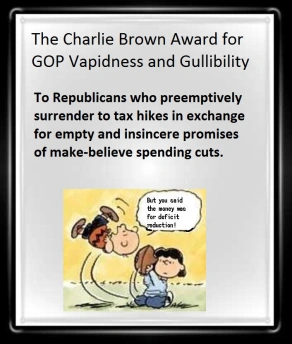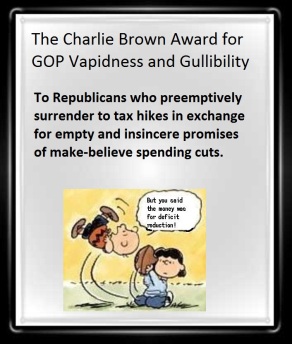As clearly shown by the Congressional Budget Office, America’s long-run fiscal challenge is an ever-growing burden of federal spending. Particularly entitlement programs.
Moreover, because the tax burden is projected to gradually increase (largely because of “real bracket creep“), it is accurate to say that more than 100 percent of America’s fiscal problem is excessive government spending. And it’s been that way for a long time.
This is one reason why tax increases would be bad public policy. Why increase the burden on American families when the problem is excessive spending by politicians?
Especially since we can deal with the symptom of red ink with some modest spending restraint.
Unfortunately, some Republicans get seduced into thinking that if they surrender on the tax issue, Democrats may get serious about spending restraint.
These are members of what I call the Charlie Brown Club.
The latest example is Congressman Jodey Arrington of Texas. Here are some excerpts from a Semafor report by Kadia Goba.
The chair of the House Budget Committee has a message for his fellow Republicans: If they ever want to fix Washington’s finances, they’ll have to talk about raising taxes. “It’s only fair to have both revenue and expenditures on the table,” Rep. Jodey Arrington, R-Texas recently told Semafor… The fiscal commission he’s championed would be charged with crafting a plan to stabilize the federal debt as a share of the economy… Washington has seen versions of this movie before. The blue ribbon Simpson-Bowles commission famously failed to approve its own plan in 2010… Arrington argues…pressure for a bipartisan budget solution… “Without discussing the revenue side, you will never have a commission and you will never have Democrats show up for a consensus solution,” he said.
I’ve already explained why Arrington is wrong. We have a spending problem, not a revenue problem.
But the Texas Congressman obviously is convinced we have a deficit problem, and this misplaced focus leads him to think Republicans need to surrender on the tax issue.
Today, I won’t to show why he’s wrong. And we’ll start by accepting his misguided premise that America’s fiscal challenge is too much red ink.
There are two scenarios for how to reduce deficits and debt:
- With divided government, have a bipartisan budget deal based on higher taxes and spending restraint.
- Wait for GOP control and resuscitate something akin to the Ryan budget, based on entitlement reform.
From a practical perspective, even if the only goal is controlling red ink, the second option is the way to go. Republicans were pushing such an approach last decade.
The first option, by contrast, is a recipe for a bigger fiscal mess.
This is because tax-hiking budget deals have a terrible track record. Simply stated, they don’t reduce red ink. There are three big reasons why that happens.
- The economy suffers because of the tax increases, and that means less taxable income. So the projected tax increases don’t raise as much revenue as politicians think.
- Once tax increases are part of the discussion, any hope of genuine spending restraint goes out the window. Indeed, politicians usually respond with spending increases.
- The supposed spending cuts aren’t real spending cuts, just reductions in previously planned increases. And the likelihood of structural reform is vanishingly small.
I’ll close by (sort of) contradicting everything I just wrote.
As I explained way back in 2012, I would accept a big tax hike. But only if taxpayers got a major benefit in exchange such as real entitlement reform, eliminating wasteful departments, and/or enacting a flat tax.
Today, I’ll add a fourth potential item for trade. I’ll accept a big tax hike in exchange for an ironclad spending cap, sort of like the one that has been so successful in Switzerland.
Needless to say, the odds of getting any of these four things from Joe Biden or Chuck Schumer are the same as the odds of me playing centerfield this year for the New York Yankees.
P.S. If you want an example of failed bipartisan deals, check out the Simpson-Bowles package.
P.P.S. I admit that GOP control won’t solve the problem if the president is a big spender like Trump.
By Dan Mitchell. Original here. Reproduced with permission.


